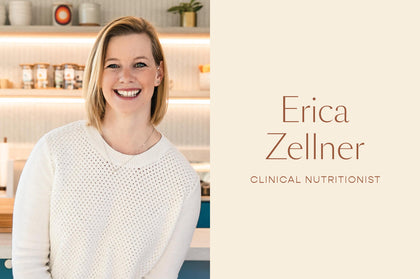As a clinical nutritionist, I know that hair growth and health are impacted daily by your routines, your choices and your habits. On average, your hair will grow one-half inch each month; however, this can be faster or slower based on factors like your age, genetics and nutritional habits.
And while you can’t change your age or your genes, you do have a lot of control over your diet. Here are three ways your nutrition impacts your hair — plus, information on what you should actually be doing to encourage thicker, fuller, healthier hair.
#include-related-slider#
1. Blood Sugar Regulation
You may think you’re immune from blood sugar being a factor for your hair if you don’t have Type 1 or Type 2 Diabetes. Unfortunately, according to a 2015 study, approximately half of Americans have diabetes or pre-diabetes (insulin resistance). What do your blood sugar and hair health have in common? Quite a lot, as it turns out!
As a quick refresher, when you eat (especially carbohydrates), your digestive system breaks down your food into simple sugars. These sugars are then released into your bloodstream and sent all over your body to keep you moving. The hormone insulin acts as the key, opening the cells and allowing glucose (sugar) into them. When our cells use the sugars from our meals, our blood sugar level goes down. Unfortunately for many, the cells in our body stop responding to insulin correctly, also known as insulin resistance. When this happens, your pancreas has to produce even more insulin (think about it like turning the volume up) to keep your blood sugar levels stable and help your cells continue to take in glucose.
Over time, this can cause chronically elevated blood sugar levels, which can wreak havoc on your health and your hair! Excess sugars can damage the blood vessels that are responsible for carrying oxygen and nourishment to your hair follicles. The reduction in oxygen and nutrients can significantly affect your normal hair growth cycle.
Read: Is There a Connection Between Diabetes and Hair Loss?
How To Prevent Elevated Blood Sugar Levels
Focus on blood-sugar balanced meals and snacks throughout your day. Each meal and snack should have a source of fiber, fat and protein, in addition to any starch or carbohydrate that you’re consuming. When your meals and snacks are balanced, we’re actively slowing down any blood sugar rise in your body and giving your digestive system more time to process the food and respond slowly with manageable amounts of insulin, rather than quickly with more of the hormone.
Ideally, meals and snacks should be approximately half fiber, one-quarter protein and fat, and one-quarter starch. This can look like the following large salad:
- Fiber: Greens and non-starchy veggies
- Fiber, starch and protein: Black beans and chickpeas
- Protein and fat: Hempseeds
- Protein and starch: Quinoa
- Fat: Extra-virgin olive oil, lemon, salt, and pepper combined to make a dressing
Striving to eat a nutritionally balanced diet each day is key to your overall health, but it doesn't hurt to add a hair-healthy supplement to the mix. Consider 100% vegan GRO Biotin Gummies, which contain biotin and folic acid, plus zinc to help promote scalp health. Vitamins B-5, 6 and 12, as well as vitamins A, C and E, are also included in each delicious, strawberry-flavored gummy.
2. Adequate Protein Intake
Your hair follicles are made up of mostly protein, and the hair strand is made of the protein keratin. This means that a lack of protein in the diet can promote hair thinning and loss.
How do you know your hair needs more protein? Keep an eye on your hair for the following red flags:
- Your hair is unusually frizzy. This happens when your hair is more porous than normal. Low protein in your diet can make your hair more porous
- Your hair is limp or stringy. Flat, limp or stringy hair is a huge sign that your diet needs more protein!
- Your hair has become overly damaged. If your hair is suddenly dry, brittle, difficult to manage, or you’re finding a ton of split ends, you likely need more protein in your diet.
Shop Erica's Favorite Hair Wellness Products
How Much Protein Should You Eat Each Day?
A good starting point for most people is going to be around 0.7g/lb of body mass. Note, this is approximately 2x the Recommended Dietary Allowance (RDA) of 0.36g/lb of body weight. This increase in protein is based on emerging research that supports a minimum protein intake for adults of 25–30 g/meal!
To put this into perspective, someone that weighs 100lbs would need to eat 70g of protein each day. I also recommend dividing that up fairly evenly throughout the day, so you stay satisfied between meals.
In addition to upping your protein intake to help strengthen your hair, you should also consider applying GRO Hair Serum, which contains powerful vegan phyto-actives. It can:
- Reduces signs of shedding by up to 85%*
- Increase the appearance of hair density by up to 56%*
*Based on a 120-day independent, third-party clinical study with 40 participants using GRO Hair Serum once daily.
Find Out: 5 Pantry Items Erica Keeps Stocked for Healthy Hair
3. Proper Hydration
It probably comes as no surprise that your hair needs hydration to be healthy. Unfortunately, 75% of Americans are chronically dehydrated. When you’re dehydrated, your body will redirect water to the most critical functions, leaving your hair to fend for itself. As a result, your hair growth can slow or stop temporarily, and each hair strand may become brittle and lose its shine.
What does adequate hydration look like for you? Easy! Divide your body weight in half. That’s how many ounces of water (and hydrating fluids like herbal tea) you should aim for each day. To use the same example as our protein recommendation, if you weigh 100lbs, you should aim for at least 50 ounces of water each day. And before you ask, no, you don’t have to subtract your daily latte from your hydration status. While caffeine does have a slight diuretic effect, it is slight. However, I do tend to recommend that my patients not count it toward their daily hydration.
If you work out regularly or live in a particularly hot or humid climate, you will likely need more hydration. For exercise, start by adding 12 ounces for every 30 minutes of activity.
You can also consider using a nourishing and hydrating shampoo and conditioner, such as GRO Revitalizing Shampoo and Conditioner. Both formulas contain wild harvested marula oil, organic murumuru butter and ximenia oil, which condition and hydrate your hair without weighing it down or leaving residue on your scalp.
The Takeaway
Your best hair starts from within. Managing your nutrition, from blood sugar balance to proper macronutrient intake (like protein), and making sure you’re well-hydrated can go a long way to supporting your best self!
If this feels a little bit overwhelming, start small! What’s one thing that you can do today to bring yourself closer to your healthiest self? Maybe it’s an extra refill on your water bottle or adding more fiber to each meal. Small changes can add up to really big results in the nutrition world!
And while you’re working on yourself from the inside, you can support your hair health externally with VEGAMOUR’s full line of hair wellness products, including supplements, serums, foams, shampoos and conditioners to promote thicker, fuller-looking hair.
#include-related-slider#
More From VEGAMOUR
- Nutrition Tips to Support Hair Growth after Cancer Treatment
- 7 Benefits of Cayenne Pepper Extract for Hair
- These Are The Benefits of L-Lysine for Hair
- 7 Lifestyle & Nutrition Changes to Reduce Stress



















